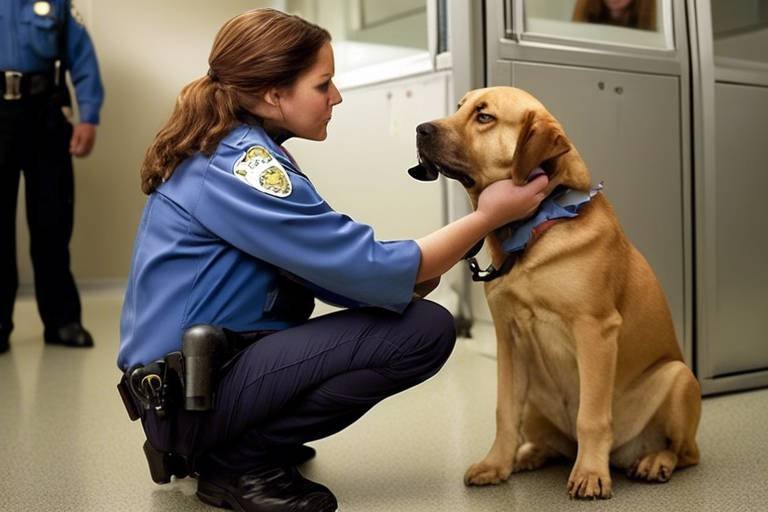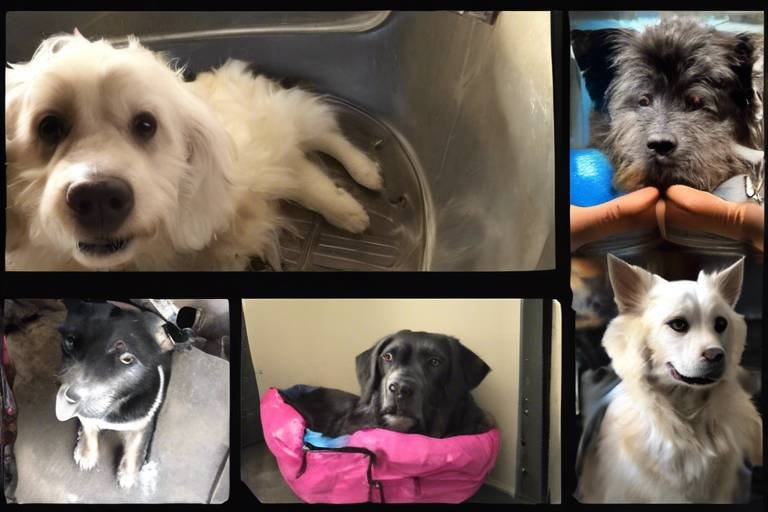How to Support Local Animal Shelters
Animal shelters play a crucial role in our communities, serving as safe havens for countless animals in need. These organizations work tirelessly to rescue, rehabilitate, and rehome animals that have faced neglect, abandonment, or abuse. However, their efforts often hinge on the support of compassionate individuals like you. By stepping up to assist local animal shelters, you not only help animals find loving homes but also foster a sense of community and responsibility. So, how can you get involved? Let’s dive into the various ways you can make a difference!
To effectively support local animal shelters, it's essential to first understand the myriad challenges they face. Many shelters operate on tight budgets, often relying on donations and volunteer efforts to keep their doors open. They may struggle with:
- Funding: Limited financial resources can restrict the quality of care provided to animals.
- Space: Many shelters are overcrowded, leading to stressful conditions for both animals and staff.
- Awareness: A lack of community knowledge about the shelter's mission can hinder support and adoption rates.
By recognizing these needs, you can tailor your contributions—whether it’s time, supplies, or advocacy—to create a more significant impact.
One of the most rewarding ways to support local animal shelters is by volunteering your time. Not only does volunteering help the organization, but it can also enrich your life in unexpected ways. Imagine walking a dog that hasn't felt the warmth of a loving touch in months or playing with a kitten that brings joy to your day. Your efforts can directly enhance the lives of these animals, making it a win-win situation!
Animal shelters offer a variety of volunteer positions that cater to different interests and skill sets. Here are some common opportunities:
- Hands-On Animal Care: This includes feeding, grooming, and exercising animals, ensuring they receive the care they need.
- Administrative Support: Help with paperwork, scheduling, and other organizational tasks that keep the shelter running smoothly.
- Fundraising Events: Participate in or organize events to raise money for the shelter's operations.
Finding the right fit for your skills and interests can maximize your contribution and enhance the shelter's overall operations.
Engaging in hands-on animal care is perhaps the most fulfilling way to volunteer. You’ll have the chance to interact directly with the animals, providing them with the love and attention they desperately need. Responsibilities may include:
- Walking dogs and providing them with exercise.
- Socializing with cats to help them feel more comfortable.
- Cleaning cages and ensuring living areas are hygienic.
This experience is not only rewarding but also vital for the emotional and physical well-being of the animals.
While hands-on care is essential, shelters also require help with administrative tasks and fundraising efforts. If you have organizational skills, consider volunteering for:
- Data entry and record-keeping.
- Creating promotional materials for events.
- Assisting with grant writing or sponsorship outreach.
Your contributions in these areas can significantly enhance the shelter's ability to operate efficiently and effectively.
Raising awareness about the shelter's mission and needs is vital for garnering support. Engage your community through:
- Social media campaigns that highlight adoptable pets.
- Hosting informational sessions to educate others about the importance of animal welfare.
- Collaborating with local businesses for fundraising events.
By spreading the word, you can encourage others to join the cause and support local animal welfare initiatives.
Donations of supplies, food, and funds are critical for shelters. Understanding what items are most needed can help you make thoughtful contributions that directly benefit the animals. Commonly requested supplies include:
- Pet food (both dry and wet).
- Bedding and blankets for comfort.
- Toys to keep animals mentally stimulated.
Your donations can significantly enhance the shelter's capabilities and improve the lives of the animals in their care.
It’s important to be mindful of the specific supplies that shelters often require. Many shelters maintain a wishlist that outlines their most pressing needs. By checking with your local shelter, you can ensure that your contributions make the biggest impact.
Monetary donations can make a big difference for shelters. These funds can be allocated to veterinary care, food supplies, and facility maintenance. Consider setting up a regular donation or sponsoring a specific program within the shelter to provide ongoing support and stability.
Advocacy is a powerful tool for supporting local animal shelters. You can become an advocate for animal rights and welfare in your community by:
- Engaging with local government to push for better animal welfare policies.
- Promoting adoption and fostering programs to reduce the number of homeless animals.
- Educating others about responsible pet ownership and the importance of spaying/neutering.
Your voice can help create lasting change and improve the lives of countless animals.
Engaging with local government can lead to better policies for animal welfare. Attend town hall meetings, communicate your concerns, and propose ideas that can create a more supportive environment for shelters. Your advocacy can pave the way for improved regulations and funding for animal welfare initiatives.
Promoting adoption and fostering programs helps reduce the number of homeless animals. Encourage your community to adopt pets from local shelters by sharing heartwarming stories and success cases. You can also organize fostering events that allow families to temporarily care for animals, giving them a taste of the joy that comes with pet ownership.
1. How can I find local animal shelters in my area?
You can search online for animal shelters or rescue organizations in your community. Websites like Petfinder or the ASPCA can also help you locate nearby shelters.
2. What items are most needed at animal shelters?
Commonly needed items include pet food, blankets, toys, and cleaning supplies. Check with your local shelter for their specific wishlist.
3. Can I volunteer if I have no experience with animals?
Absolutely! Many shelters offer training for new volunteers and have various roles that don’t require prior experience, such as administrative tasks.
4. How can I promote adoption in my community?
Share stories of adoptable pets on social media, organize adoption events, and educate others about the benefits of adopting rather than buying pets.
5. Are financial donations tax-deductible?
Yes, most animal shelters are non-profit organizations, so your donations may be tax-deductible. Be sure to keep your receipts for tax purposes.

Understanding the Needs of Animal Shelters
Animal shelters are vital institutions in our communities, providing a safe haven for countless animals in need. However, they face numerous challenges that often go unnoticed by the general public. Understanding these challenges is crucial for anyone looking to support their local shelter effectively. One of the primary issues is funding. Many shelters operate on tight budgets, relying heavily on donations and grants to cover their daily expenses. This means that every dollar counts, and your contributions can make a significant difference.
Additionally, shelters often struggle with resources. This includes not just financial resources but also physical supplies like food, bedding, and medical care for the animals. It's heartbreaking to think that a shelter may have to turn away an animal in need simply because they lack the necessary supplies or funds. By understanding these needs, you can tailor your support to fill the gaps that exist.
Moreover, the emotional and physical well-being of the animals is directly linked to the shelter's capacity to provide care. Shelters often operate with limited staff and rely heavily on volunteers. This means that your time and skills can be just as valuable as monetary donations. Whether it's walking dogs, socializing cats, or helping with administrative tasks, your involvement can significantly enhance the shelter's operations.
In summary, the needs of animal shelters are multifaceted, encompassing financial, physical, and human resources. By recognizing these challenges, you can become a more effective supporter of your local shelter, ultimately improving the lives of the animals that depend on these organizations. Every effort counts, and together, we can create a more supportive environment for our furry friends in need.

Volunteering Your Time
Volunteering at a local animal shelter is one of the most rewarding things you can do. Not only does it provide essential support to the shelter, but it also allows you to connect with animals that truly need love and care. Imagine walking into a shelter filled with wagging tails and curious meows—each animal waiting for a chance at a better life. By dedicating your time, you become a vital part of their journey to finding a forever home.
There are countless ways you can volunteer your time, depending on your interests and skills. For instance, if you’re an animal lover, you might find joy in hands-on care, such as walking dogs or socializing cats. These activities not only improve the animals' well-being but also help them become more adoptable. On the other hand, if you have a knack for organization, you could assist with administrative tasks or help with fundraising events, ensuring that the shelter runs smoothly and efficiently.
Here’s a quick overview of some volunteer opportunities you might consider:
- Hands-On Animal Care: Feeding, grooming, and exercising the animals.
- Administrative Support: Helping with paperwork, data entry, and scheduling.
- Fundraising and Events: Organizing events to raise money and awareness for the shelter.
Engaging in hands-on animal care allows you to directly improve the lives of sheltered animals. Whether it’s taking dogs for walks or simply spending time with them, your presence can make a world of difference. These activities not only provide physical benefits for the animals but also emotional support. Imagine being a source of comfort for a scared dog or a shy cat—your kindness can help them trust humans again.
Moreover, volunteering your time isn’t just about giving; it’s also about receiving. Many volunteers find that spending time with animals can be therapeutic. The unconditional love and joy that animals provide can lift your spirits and reduce stress. It’s a win-win situation: you’re helping the animals while also enriching your own life.
So, how do you get started? Most shelters have an application process, which may include an orientation session to familiarize you with their operations and guidelines. It’s essential to understand the shelter’s needs and how you can best contribute. By aligning your skills and interests with the shelter’s requirements, you can maximize your impact.
In conclusion, volunteering at a local animal shelter is an incredible opportunity to make a difference in the lives of animals while enriching your own life. Whether you choose to engage in hands-on care or lend your organizational skills, your time and effort will be invaluable to the shelter and the animals it serves. So why wait? Reach out to your local shelter today and find out how you can help!
Types of Volunteer Opportunities
When it comes to volunteering at local animal shelters, the opportunities are as diverse as the animals themselves! Each shelter has its own unique needs, and by understanding these, you can find a way to contribute that not only suits your skills but also makes a real difference in the lives of these animals. Whether you’re a dog lover, a cat whisperer, or someone who enjoys working behind the scenes, there’s a spot for you!
One of the most fulfilling ways to contribute is through hands-on animal care. This involves tasks like walking dogs, socializing with cats, and even helping with grooming. Imagine the joy of seeing a once-timid dog blossom into a confident companion just because you took the time to walk and play with them! Not only does this improve the animals' quality of life, but it also helps them become more adoptable. Shelters often have a variety of animals with different temperaments, so you can choose to work with those that resonate with you the most.
If you prefer a more structured environment, administrative and fundraising support might be your calling. Shelters need help with everything from data entry and organizing events to managing social media accounts. Your organizational skills can streamline operations and ensure that the shelter runs smoothly. Additionally, fundraising is critical; many shelters rely on donations to stay afloat. By organizing events or campaigns, you can directly contribute to raising the funds necessary for food, medical care, and shelter maintenance.
Moreover, there are opportunities for community outreach. Shelters often look for volunteers who can help raise awareness about their mission. This could involve attending local events, speaking to groups about the importance of animal adoption, or even creating informative materials to distribute in your community. Your passion for animal welfare can inspire others to get involved, creating a ripple effect of support that benefits the shelter and the animals it serves.
In summary, whether you're getting your hands dirty with animal care, organizing events to raise funds, or spreading the word about the shelter's mission, there’s a volunteer opportunity that fits your interests and skills. By dedicating your time and talents, you’re not just helping the animals; you’re also enriching your own life with meaningful experiences and connections. So, what are you waiting for? Dive in and discover how you can make a difference!
1. How do I find a local animal shelter to volunteer at?
You can start by searching online for animal shelters in your area. Websites like Petfinder or the ASPCA also provide resources to find local shelters. Don’t hesitate to reach out directly to inquire about volunteer opportunities!
2. Do I need any special skills to volunteer?
While some roles may require specific skills, many volunteer positions are open to anyone with a passion for animals. Shelters often provide training for their volunteers, so don’t worry if you’re new to animal care!
3. Can I volunteer if I have a full-time job?
Absolutely! Many shelters offer flexible volunteer hours, including evenings and weekends. You can find a schedule that works for you, whether it’s a few hours a week or a monthly commitment.
4. What should I wear when volunteering?
It’s best to wear comfortable, weather-appropriate clothing that you don’t mind getting dirty. Closed-toed shoes are a must, especially if you’re handling animals or working outside.
Hands-On Animal Care
Engaging in at your local shelter is not just about lending a helping hand; it’s about creating a bond that enriches both your life and the lives of the animals in need. Imagine walking into a shelter filled with wagging tails and hopeful eyes, each one waiting for a gentle touch or a kind word. By volunteering your time, you become a vital part of their journey towards finding a forever home.
When you dedicate yourself to hands-on animal care, you take on various responsibilities that directly impact the well-being of the animals. This can include activities such as walking dogs, socializing with cats, or even assisting in the grooming of pets. Each task, no matter how small it may seem, plays a crucial role in helping these animals feel loved and cared for. For instance, regular walks not only provide physical exercise but also stimulate the dogs mentally, making them more adoptable.
Here are some key responsibilities you might undertake:
- Feeding: Ensuring that animals receive nutritious meals on schedule is essential for their health.
- Cleaning: Maintaining a clean and safe environment helps prevent the spread of diseases.
- Socialization: Spending time with animals helps them become more comfortable around people, making them more adoptable.
- Training: Teaching basic commands can greatly enhance an animal's chances of finding a loving home.
But it’s not just about the tasks; it's about the emotional connection you build. Picture yourself sitting in a quiet corner of the shelter, a timid dog nestled beside you, slowly warming up to your presence. These moments of connection are what make hands-on animal care so fulfilling. You are not just a volunteer; you are a source of comfort and stability in a world that can often feel overwhelming for these animals.
Moreover, volunteering provides you with a unique opportunity to learn about animal behavior and care practices. Many shelters offer training sessions for volunteers, equipping you with the knowledge you need to handle different situations effectively. This can be invaluable, especially if you are considering adopting a pet in the future. Understanding the nuances of animal behavior can prepare you for the joys and challenges of pet ownership.
In addition to the emotional rewards, hands-on animal care can also lead to lasting friendships with fellow volunteers. Working alongside others who share your passion for animal welfare can create a supportive community that extends beyond the shelter walls. You might find yourself exchanging stories, tips, and even plans for future initiatives that benefit the shelter.
In conclusion, engaging in hands-on animal care is an enriching experience that not only enhances the lives of sheltered animals but also transforms your own. Whether you're walking dogs, socializing with cats, or assisting in care routines, every moment spent at the shelter is a step towards making a difference. So, why not take that step today? Your local shelter is waiting for compassionate individuals like you to help create a brighter future for animals in need.
Q: Do I need any prior experience to volunteer for hands-on animal care?
A: No prior experience is necessary! Most shelters provide training for new volunteers, and your willingness to learn and help is what matters most.
Q: What should I wear when volunteering at an animal shelter?
A: Dress comfortably and wear closed-toe shoes. It's also a good idea to wear clothes that you don't mind getting dirty, as working with animals can be messy!
Q: How much time do I need to commit to volunteering?
A: Many shelters have flexible schedules, allowing you to volunteer as much or as little as you can. Even a few hours a week can make a significant impact.
Q: Can I bring my own pet when volunteering?
A: Generally, it’s best to leave your pet at home unless the shelter has specific programs that allow for it. This helps prevent any potential stress for the animals already in the shelter.
Administrative and Fundraising Support
When it comes to supporting local animal shelters, many people think of volunteering their time directly with the animals. However, is equally crucial for keeping these organizations running smoothly. Shelters often operate on tight budgets and lean staff, meaning that every bit of help counts. By lending your skills in administration or fundraising, you can make a significant impact while also gaining valuable experience.
Administrative tasks can range from managing social media accounts to organizing events and maintaining records. If you have a knack for organization or communication, your contributions can help streamline operations and ensure that the shelter runs efficiently. For example, shelters often need help with:
- Data entry and record keeping
- Managing volunteer schedules
- Creating promotional materials
- Updating the shelter's website
On the fundraising front, your creativity and resourcefulness can help raise much-needed funds. Organizing events like bake sales, charity runs, or online crowdfunding campaigns can generate significant financial support. Additionally, you can assist shelters in applying for grants or sponsorships, which can provide ongoing financial stability. Here are some effective fundraising ideas you might consider:
- Host a community pet wash
- Organize a silent auction with local businesses
- Start a “donate your birthday” campaign on social media
Moreover, it’s essential to communicate the shelter's needs and successes to the community. By crafting compelling stories and updates, you can engage potential donors and volunteers, inspiring them to get involved. Remember, every effort you put into administrative and fundraising support not only helps the shelter but also enriches your own life through meaningful connections and experiences. So, whether you're behind the scenes or at the forefront of fundraising, your contributions are invaluable!
Q: How can I get involved with administrative support at my local shelter?
A: Reach out to your local shelter and inquire about their needs. They may have specific roles available, or you can propose your skills and how you can help.
Q: What types of fundraising events are most successful for animal shelters?
A: Events that engage the community, such as pet-related activities or themed parties, tend to be successful. It's also beneficial to leverage social media to reach a wider audience.
Q: Can I volunteer for administrative tasks if I have no prior experience?
A: Absolutely! Many shelters are open to training volunteers. Your enthusiasm and willingness to learn can be just as valuable as experience.
Building Community Awareness
Building community awareness around local animal shelters is not just a noble effort; it's a crucial step in creating a supportive environment for our furry friends in need. When communities come together to raise awareness, the impact can be profound. Imagine a world where every animal shelter is bustling with potential adopters, volunteers, and donations. Doesn't that sound like a dream come true for those animals waiting for their forever homes?
To effectively engage your community, consider hosting events that highlight the shelter's mission and the importance of animal welfare. Events such as adoption days, educational workshops, or even fun runs can draw in crowds and generate interest. People love to be part of something bigger than themselves, and by showcasing the incredible work done at local shelters, you provide them with an opportunity to contribute meaningfully.
Additionally, social media is a powerful tool that can amplify your message. By sharing heartwarming stories, pictures of adoptable pets, and information about upcoming events, you can reach a broader audience. Encourage your friends and family to share these posts, creating a ripple effect that can lead to increased support. Remember, sometimes all it takes is a single post to spark someone's interest in adopting a pet or volunteering!
Another effective strategy is to collaborate with local businesses. Many companies are eager to give back to their communities and might be willing to sponsor events or donate a portion of their sales to the shelter. This partnership not only benefits the shelter but also enhances the business's reputation within the community. It's a win-win situation! Consider approaching local cafes, pet stores, or even gyms to explore potential collaborations.
Furthermore, engaging with schools can be a game-changer. By educating children about animal welfare and the responsibilities of pet ownership, you can foster a generation of compassionate individuals. Organizing school visits or educational programs can ignite passion in young hearts, encouraging them to advocate for animals and support local shelters.
In conclusion, building community awareness is about creating connections, sparking conversations, and inspiring action. Every effort counts, whether it's sharing a post online, organizing an event, or simply talking to friends about the shelter's mission. Together, we can create a community that not only loves animals but actively supports their well-being. So, what are you waiting for? Start spreading the word and watch as your community rallies around these deserving animals!
Q: How can I get involved with my local animal shelter?
A: There are numerous ways to get involved, including volunteering, donating supplies, or attending events. Check your local shelter's website for specific opportunities.
Q: What types of donations do animal shelters need?
A: Shelters often need food, toys, bedding, and cleaning supplies. Monetary donations are also essential to help cover veterinary care and operational costs.
Q: How can I promote adoption in my community?
A: Share success stories of adopted pets on social media, organize adoption events, and encourage friends and family to consider adopting instead of buying pets.
Q: Can I volunteer if I have no experience with animals?
A: Absolutely! Many shelters offer training for new volunteers. You can help with administrative tasks, fundraising, or community outreach.
Q: How can I educate my children about animal welfare?
A: Involve them in volunteering activities, attend educational programs at local shelters, or read books about animal care together.

Donating Supplies and Resources
Donating supplies and resources to local animal shelters is one of the most impactful ways you can contribute to their mission. These shelters often operate on tight budgets and rely heavily on the generosity of the community to provide the necessary care for their animals. By understanding what items are most needed, you can ensure that your contributions make a real difference. Imagine walking into a shelter and seeing happy, healthy animals thriving because of your support. It’s a gratifying feeling that not only uplifts the animals but also strengthens your bond with the community.
Animal shelters require a variety of supplies to function effectively. Commonly needed items include food, bedding, toys, and medical supplies. For instance, shelters often have a constant need for dry and wet food, especially for specific dietary requirements. Providing these essentials can help maintain the health and wellbeing of the animals. Additionally, items like blankets and bedding help create a comfortable environment, while toys can provide much-needed stimulation and playtime for the animals.
Here's a quick overview of some essential supplies that shelters typically need:
| Item | Description | Why It's Needed |
|---|---|---|
| Dog and Cat Food | Dry and wet food suitable for various ages and dietary needs. | To ensure proper nutrition and health of the animals. |
| Bedding | Blankets, towels, and pet beds. | For comfort and warmth, especially during colder months. |
| Toys | Durable toys for dogs and cats. | To keep animals entertained and mentally stimulated. |
| Cleaning Supplies | Disinfectants, mops, and trash bags. | To maintain a clean and sanitary environment. |
| Medical Supplies | Basic first aid kits, flea treatments, and medications. | For the immediate care of injured or ill animals. |
Moreover, financial contributions can also play a significant role in supporting shelters. Monetary donations can help cover the costs of veterinary care, food purchases, and even shelter maintenance. Many organizations offer sponsorship programs, allowing you to support a specific animal or project, which can provide ongoing stability for the shelter. Think of it as investing in the future of these animals, giving them a chance at a better life.
When considering your donations, it’s essential to communicate with your local shelter to find out their most pressing needs. Some shelters may have specific items they are currently lacking due to unforeseen circumstances. By reaching out, you can ensure that your contributions are both timely and relevant. This not only maximizes the impact of your donation but also fosters a sense of community connection.
In conclusion, your support through donations of supplies and resources can transform the lives of countless animals. Whether it’s a bag of food, a cozy blanket, or a financial contribution, every bit helps. So, why not take that first step today? Reach out to your local animal shelter, find out what they need, and become a part of the solution. Together, we can create a brighter future for our furry friends.
1. What types of supplies do animal shelters need most?
Animal shelters typically need food, bedding, toys, cleaning supplies, and medical supplies. It's best to check with your local shelter for their specific needs.
2. Can I donate used items?
Many shelters accept used items like blankets and towels, but it's important to ensure that they are clean and in good condition. Always check with the shelter first.
3. How can I make a financial contribution?
You can make a financial contribution directly through the shelter’s website, or by participating in fundraising events they may host. Every little bit helps!
4. Are there tax benefits for donating to animal shelters?
Yes, donations to registered non-profit animal shelters are often tax-deductible. Be sure to keep your receipt for tax purposes.
5. Can I volunteer my time instead of donating supplies?
Absolutely! Volunteering your time is another excellent way to support animal shelters. They often need help with various tasks, from animal care to administrative work.
Essential Supplies for Shelters
When it comes to supporting local animal shelters, one of the most impactful ways you can contribute is by donating essential supplies. These shelters operate on tight budgets and often struggle to provide basic necessities for the animals in their care. By understanding what items are most needed, you can make thoughtful donations that directly enhance the quality of life for these animals. Think of it as providing a lifeline to those who cannot speak for themselves; every small contribution counts!
Animal shelters typically require a variety of supplies to ensure that the animals are well cared for. Here’s a breakdown of some of the most essential items:
| Item | Purpose |
|---|---|
| Dry Dog Food | Provides essential nutrition for dogs. |
| Canned Cat Food | Helps keep cats hydrated and provides a balanced diet. |
| Bedding (Blankets, Towels) | Keeps animals comfortable and warm. |
| Toys (Balls, Chew Toys) | Offers mental stimulation and helps reduce stress. |
| Leashes and Collars | Essential for walking and controlling animals. |
| Cleaning Supplies (Disinfectants, Mops) | Maintains a clean and healthy environment. |
Beyond just food and bedding, shelters also appreciate donations of cleaning supplies, which are crucial for maintaining hygiene and preventing the spread of disease among the animals. Imagine the relief of a shelter worker knowing they have the resources to keep their facility clean and safe! Furthermore, toys are not just luxuries; they play a vital role in keeping animals mentally stimulated and happy, which is essential for their overall well-being.
Another often-overlooked aspect is the need for veterinary supplies. Items like flea treatments, first aid kits, and basic medications can significantly impact the health of the animals in shelters. Donating these supplies can help shelters provide immediate care to animals that are sick or injured. It’s like giving them a second chance at life!
So, if you're considering how to help your local animal shelter, think about what you can gather from your home or purchase to donate. Every contribution, no matter how small, can have a ripple effect, transforming the lives of countless animals. It’s not just about filling a need; it’s about fostering a community of compassion and care. After all, when you support your local shelter, you’re not just helping animals; you’re also enriching your own life by being part of something bigger than yourself.
Financial Contributions and Sponsorships
When it comes to supporting local animal shelters, financial contributions and sponsorships play a crucial role in ensuring these organizations can continue their lifesaving work. Imagine a world where every animal has a warm bed, nutritious food, and the medical care they need. Your financial support can help turn this vision into reality. With limited resources, shelters often rely heavily on donations to cover operational costs such as veterinary care, food supplies, and facility maintenance. Without these funds, many shelters would struggle to provide even the most basic necessities for their furry residents.
One of the most impactful ways to contribute is through monetary donations. These contributions can be one-time gifts or recurring donations, providing shelters with the flexibility to allocate funds where they are needed most. For example, a monthly donation of just $10 can help provide food for several animals, while a larger donation could cover essential medical treatments. It's important to consider how your financial support can create a ripple effect, improving the lives of countless animals in need.
Additionally, many shelters offer sponsorship opportunities that allow you to support individual animals or specific programs. By sponsoring a pet, you not only help cover their care costs but also create a personal connection with the animal you are helping. This can be incredibly rewarding, as you receive updates on your sponsored pet and see the direct impact of your generosity. Sponsorships can also extend to special programs, such as spay/neuter initiatives, which are vital for controlling the pet population and preventing future homelessness.
Moreover, many employers offer matching gift programs, which can double or even triple your contributions. By checking with your employer, you can maximize your impact without stretching your budget. This is a simple yet effective way to make your donations go even further, amplifying your support for local shelters.
In essence, financial contributions and sponsorships are not just about giving money; they are about investing in a future where every animal is cared for and loved. Your support can help shelters provide essential services, improve their facilities, and ultimately save more lives. So, consider how you can make a difference today—whether it's a small monthly donation or a larger sponsorship commitment, every bit counts!
- How can I ensure my donation is used effectively? - Research the shelter's financials and programs. Many reputable organizations provide transparency regarding how donations are spent.
- Can I donate supplies instead of money? - Absolutely! Many shelters appreciate donations of food, bedding, and toys. It's best to check their website or call to find out what they need most.
- Are donations tax-deductible? - Yes, most donations to registered non-profit organizations are tax-deductible. Be sure to keep your receipt for tax purposes.
- What if I can't afford to donate money? - There are many ways to help without financial contributions, such as volunteering your time or spreading the word about the shelter's needs.

Advocating for Animal Welfare
Advocating for animal welfare is not just a noble endeavor; it's a powerful tool for creating lasting change in your community. When you become an advocate, you are not only raising your voice for the voiceless but also inspiring others to join the cause. This can lead to significant improvements in the lives of countless animals who are in desperate need of care and attention. But how do you start? It can feel overwhelming, but remember, every small action counts. You can begin by educating yourself about the issues that local shelters face and the broader challenges in animal welfare.
One effective way to advocate is by engaging with local government. This means attending town hall meetings, reaching out to your representatives, and voicing your concerns about animal welfare policies. Have you ever thought about how much influence you can have just by sharing your thoughts? Local governments often rely on community input to shape policies, and your voice can help create a more supportive environment for shelters. You might consider organizing a meeting with local officials to discuss the needs of your shelter and how they can provide support. It’s a bit like planting seeds; with time and care, they can grow into something impactful.
Another crucial aspect of advocacy is promoting adoption and fostering programs. Did you know that fostering pets can save lives? Shelters are often overcrowded, and fostering helps alleviate that pressure. By encouraging your friends and family to adopt or foster, you’re not only giving an animal a home but also opening up space for other animals in need. You could host an event to showcase adoptable pets or share heartwarming success stories on social media. Remember, the more people know about the joys of adopting, the more likely they are to consider it.
Additionally, you can utilize your social media platforms to raise awareness about local shelters and their missions. Think of your social media as a megaphone; use it to amplify the voices of those who can’t speak for themselves. Share posts about adoptable pets, volunteer opportunities, and upcoming fundraising events. You can also create engaging content that highlights the importance of spaying and neutering pets, which helps control the pet population and reduces the number of animals in shelters.
To summarize, advocating for animal welfare involves a combination of community engagement, education, and outreach. By taking steps to connect with local government, promote adoption, and raise awareness, you can make a significant difference in the lives of animals in your community. Remember, advocacy is not a sprint; it’s a marathon. Every effort you make, no matter how small, contributes to a larger movement towards better treatment and care for animals.
- What is animal advocacy? Animal advocacy involves promoting the welfare and rights of animals, often through education, outreach, and direct action.
- How can I get involved in local animal advocacy? You can get involved by volunteering at shelters, attending local government meetings, and promoting adoption and fostering programs.
- Why is it important to advocate for animal welfare? Advocating for animal welfare helps improve the lives of animals, reduces suffering, and encourages responsible pet ownership.
- Can social media really make a difference? Absolutely! Social media can reach a wide audience, raising awareness and inspiring action for animal welfare.
Engaging with Local Government
Engaging with local government is a crucial step in advocating for animal welfare and supporting your local animal shelters. When you think about it, local government has the power to implement policies that can significantly impact the lives of animals in need. Have you ever wondered how your voice can lead to real change? By actively participating in discussions and voicing your concerns, you can help create a more supportive environment for shelters and the animals they care for.
One effective way to engage with local government is by attending community meetings or town halls. These gatherings often provide a platform for residents to express their views and ask questions. It's your chance to shine a spotlight on the challenges faced by animal shelters, such as underfunding or lack of resources. By sharing personal stories or statistics about the importance of animal welfare, you can capture the attention of local officials and inspire them to take action. Remember, your words can resonate, and they might just lead to policy changes that benefit animals.
Additionally, consider reaching out to your local representatives directly. A simple email or phone call can go a long way. When contacting them, be clear and concise about your concerns and suggestions. For example, you might propose the implementation of spay/neuter programs to control the pet population or increased funding for shelters. To make your case even stronger, you can gather data to support your claims. Statistics about the number of homeless animals in your area or the success rates of local shelters can be compelling. Here’s a quick table to illustrate how data can support your advocacy:
| Statistic | Impact |
|---|---|
| Over 6 million pets enter shelters each year | Highlights the need for more resources and fostering programs |
| Only 10-20% of shelter animals are adopted | Emphasizes the importance of promoting adoption |
| Spaying/neutering can reduce shelter intake by 90% | Supports the need for community health initiatives |
Moreover, collaborating with local animal advocacy groups can amplify your efforts. These organizations often have established relationships with government officials and can provide you with valuable insights on effective advocacy strategies. By joining forces, you can create a stronger voice that advocates for the rights and welfare of animals. Together, you can organize campaigns, petitions, or awareness events that not only engage the community but also catch the attention of local leaders.
Lastly, don't underestimate the power of social media. Platforms like Facebook and Twitter can be used to raise awareness about animal welfare issues and encourage your friends and followers to contact their local representatives. A well-crafted post can go viral, drawing more attention to your cause and prompting local officials to take notice. Remember, engaging with local government isn't just about speaking up; it's about rallying your community to join you in the fight for animal welfare.
- How can I find out about local government meetings? Check your city or county's official website for a calendar of events, or follow local news outlets.
- What should I say when I contact my representative? Be clear about your concerns, provide specific examples, and suggest actionable solutions.
- Can social media really make a difference? Absolutely! It can help spread awareness quickly and mobilize community support.
Promoting Adoption and Fostering
When it comes to supporting local animal shelters, one of the most impactful ways is by promoting adoption and fostering. Imagine walking through a shelter and seeing countless furry faces, each one hoping for a forever home. By encouraging your community to adopt rather than shop for pets, you're not just saving a life; you're also making room for more animals in need. Adoption is a beautiful act of kindness that transforms both the animal's life and the adopter's. It's like finding a missing piece of a puzzle—suddenly, everything feels complete!
Fostering, on the other hand, is a temporary but vital solution that allows shelters to free up space and resources. When you foster an animal, you're providing a safe haven where they can thrive until they find their forever home. This experience can be incredibly rewarding, as you get to witness the transformation of a scared, homeless animal into a confident companion. Have you ever thought about how much love and joy a pet can bring into your life? By fostering, you're not just helping the animal; you're also enriching your own life with companionship and purpose.
To effectively promote adoption and fostering in your community, consider the following strategies:
- Organize Adoption Events: Partner with local shelters to host adoption days at community events or popular venues. This can create buzz and attract potential adopters.
- Utilize Social Media: Share heartwarming stories and photos of animals available for adoption on platforms like Facebook, Instagram, and Twitter. Use hashtags to reach a broader audience.
- Connect with Local Businesses: Collaborate with pet stores, cafes, and other businesses to display adoptable pets’ profiles or host adoption drives.
- Educate the Community: Offer workshops or information sessions about the benefits of adopting and fostering animals. Knowledge is power, and the more people know, the more likely they are to act.
Adopting or fostering a pet isn't just a one-time act; it's a commitment to a new family member. By spreading the word and sharing your own experiences, you can inspire others to take this rewarding step. After all, every time someone adopts or fosters, a shelter animal gets a second chance at life, and that ripple effect can change the world one paw at a time.
Q: What is the difference between adopting and fostering?
A: Adopting means bringing a pet into your home permanently, while fostering is a temporary arrangement where you care for an animal until they find a permanent home.
Q: Can I foster if I have other pets?
A: Yes, many people successfully foster animals while having their own pets. It's important to introduce them gradually and ensure everyone is comfortable.
Q: What should I expect when adopting a pet?
A: Expect to provide a loving home, regular vet visits, and training. Each pet is unique, so be prepared for some adjustments as they settle in.
Q: How can I help promote adoption and fostering in my community?
A: You can organize events, share stories on social media, and educate others about the benefits of adopting and fostering pets.
Frequently Asked Questions
-
What are the most common needs of local animal shelters?
Animal shelters typically face challenges like funding shortages, lack of supplies, and the need for volunteer support. They often require food, bedding, toys, and medical supplies to care for the animals effectively. Understanding these needs can help you make targeted contributions that truly make a difference.
-
How can I volunteer at my local animal shelter?
Volunteering is a fantastic way to support local shelters! Most shelters have an application process where you can express your interest. You can help with hands-on animal care, administrative tasks, or even fundraising efforts. Just reach out to your local shelter and ask about their volunteer opportunities!
-
What supplies are most needed by animal shelters?
Animal shelters often need a variety of supplies, including pet food, blankets, toys, cleaning products, and medical supplies. It's a good idea to check with your local shelter to see what specific items they currently need, as these can vary based on their current inventory and the animals they have.
-
Can I make a financial donation to an animal shelter?
Absolutely! Financial contributions are vital for shelters to operate effectively. These funds can go towards food, medical care, and other essential services. Many shelters also offer sponsorship programs, allowing you to support a specific animal or initiative directly.
-
How can I promote animal adoption in my community?
Promoting animal adoption can be as simple as sharing information on social media, organizing community events, or collaborating with local businesses to raise awareness. You can also encourage friends and family to consider adopting pets instead of buying them, which helps reduce the number of homeless animals.
-
What role does advocacy play in supporting animal shelters?
Advocacy is crucial for creating better policies and support systems for animal welfare. By engaging with local government and raising awareness about animal rights, you can help influence changes that benefit shelters and the animals they care for. Every voice counts!



















